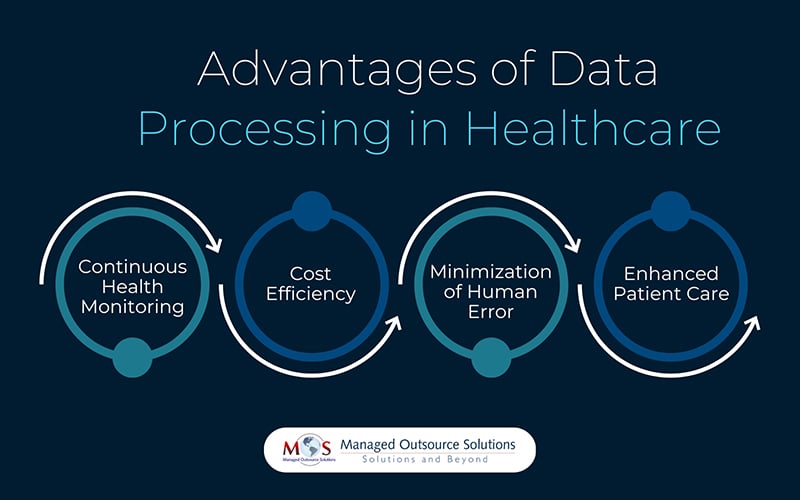In the ever-evolving healthcare industry, robust data is more critical than ever. With the integration of advanced digital technologies, healthcare providers are increasingly relying on data processing solutions to streamline operations, enhance patient care, and foster innovative research. Accurate and timely data entry services provide the basis for data processing and analysis.
How Good Data Can Improve Healthcare
Good data transforms the way healthcare organizations operate. Accurate, up-to-date patient records and clinical data lead to better diagnosis, treatment, and outcomes. When healthcare providers have access to high-quality data, they can personalize patient care, improve operational efficiency, and make informed decisions that save lives. Data processing services facilitate this by ensuring that data is captured accurately, stored securely, and analyzed effectively.
With precise data entry, hospitals and clinics can maintain comprehensive electronic health records (EHRs) that offer a complete view of patient history. This integration of data supports everything from routine check-ups to complex surgeries. With accurate information at their fingertips, clinicians can identify patterns, predict health trends, and deliver more effective treatment plans, ultimately leading to enhanced patient care and satisfaction.
Key Growth Drivers of Modern Healthcare
The transformation in healthcare isn’t just a technological upgrade—it’s a paradigm shift driven by three key growth drivers: patient experience, collaborative care, and operational efficiency.
- Patient Experience: A personalized approach to healthcare is pivotal in today’s competitive environment. When patient data is processed accurately, healthcare providers can tailor treatments to individual needs, leading to more personalized care. Improved data management minimizes communication gaps, resulting in fewer long wait times and a more seamless patient journey. Enhanced transparency and accuracy help build trust between patients and providers, ensuring that patients feel valued and understood.
- Collaborative Care: Collaborative care relies heavily on the seamless exchange of information among different departments and specialties. Traditionally, siloed patient data stored in disparate repositories has hampered effective communication and led to suboptimal outcomes. Modern data processing services break down these silos by centralizing data, enabling healthcare teams to work together more effectively. This collaboration not only improves clinical outcomes but also enhances the quality of research and the development of new treatment methodologies.
- Operational Efficiency: Operational efficiency is the backbone of a well-functioning healthcare system. Streamlined data processing enables better coordination between clinical and non-clinical departments, reducing administrative burdens and accelerating decision-making. By automating routine tasks and ensuring that accurate data is readily available, healthcare providers can focus more on patient care rather than paperwork. This efficiency translates into shorter patient wait times, reduced errors, and improved overall satisfaction.
Best Practices for Healthcare Data Processing
- Data Collection: Robust data tracking and analysis can drive significant improvements. By collecting data, health systems can build comprehensive patient profiles, tailor treatments, reduce communication gaps between clinicians and patients, and advance overall treatment procedures.
- Healthcare Data Collection Methods: Healthcare data is collected through various approaches including questionnaires, direct observations, and document reviews. Today, digital channels and numerous applications dominate the process. Common tools include:
- CRM Systems: These systems generate and manage general data and reports while analyzing various challenges.
- EHR Systems: Electronic health records collect and analyze patient-specific data, offering deeper insights.
- Mobile Applications: Mobile apps facilitate quick communication between doctors and patients, especially in emergencies.
- Data Aggregation: Data aggregation in healthcare involves merging multiple data types—such as health information, financial data, and test results—into a unified data asset. This process is essential for shifting from volume-based to value-based care. Aggregated data enables healthcare providers to uncover insights, patterns, and predictions that individual patient records cannot reveal. It transforms transactional data into actionable intelligence, allowing physicians to forecast outcomes and make evidence-based decisions.
- Data Analytics: Data analytics is the process of examining raw datasets to gain insights, detect patterns and trends, and identify areas for improvement. By leveraging both current and historical data, healthcare organizations can derive macro and micro-level insights that support informed decision-making at both the patient and organizational levels.
Benefits of Data Processing in the Healthcare Sector
- Continuous Health Monitoring: Healthcare organizations are increasingly focusing on the continuous tracking data related to vital signs. This allows hospitals to reduce unnecessary visits by spotting potential health risks early and intervening before conditions worsen. Wearable devices that monitor sleep, heart rate, physical activity, and distance traveled provide essential data, while modern medical tools like blood pressure monitors, pulse oximeters, and glucose meters enable proactive treatment and continuous health tracking.
- Cost Efficiency: Data processing offers hospitals a viable strategy for cost reduction. By gathering and analyzing large amounts of data, healthcare organizations can identify practical methods to boost efficiency and performance without exceeding budget limits. One key advantage is the ability to accurately forecast and allocate the right number of staff needed to manage patient care effectively.
- Minimizes Human Error: In healthcare, data processing plays a crucial role in analyzing patient data to guide medication prescriptions, significantly reducing errors such as incorrect drug dosages or misdirected medication orders. Advanced data analysis can flag potentially inappropriate prescriptions, thereby preventing mistakes and ultimately saving lives.
- Enhanced Patient Care: Processed healthcare data delivers critical insights that pave the way for more personalized care. As the industry moves towards a new standard of patient-centered and tailored services, digitizing hospital records to identify patterns among patients enables more effective care strategies. This, in turn, leads to improved patient outcomes and offers valuable information for reducing the frequency of hospital visits.
The significance of data processing in healthcare cannot be overstated. Robust data entry services not only streamlines operations but also drives substantial improvements in patient care, operational efficiency, and collaborative practices. As the healthcare industry continues to evolve, harnessing accurate and timely data will be the key to unlocking future innovations and delivering high-quality care. Data processing is also used widely in other industries also to improve efficiency and productivity. Embrace a comprehensive data processing solution to transform your healthcare delivery model and support the growth of your organization through data-driven decision-making.





